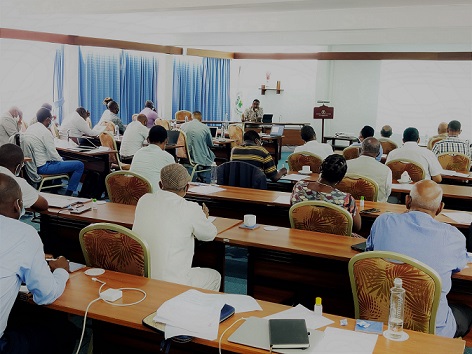11 December 2020 (MOMBASA, Kenya): The Executive Secretary of the Intergovernmental Authority on Development (IGAD), Dr Workneh Gebeyehu, today closed the Second Retreat of IGAD Management for the Formulation of the Strategy 2021-2025 for the regional organisation in Mombasa.
This four-day retreat, which was inaugurated on 8 December immediately after Dr Workneh made the first ever State of IGAD Address in the history of the organisation, brought together members of staff from the Secretariat and its specialized institutions to jointly define and elaborate the strategic priorities for the next strategic period of 2021-2025, taking into account emerging issues.

As the retreat was coming to a close, a draft outline of the strategy document containing thematic priorities, and more specifically strategic objectives, specific objectives, and key results was agreed upon.
The participants had worked on:
- Defining and elaborating strategic priorities under each thematic in line with the global, continental and national plans and agendas;
- Identifying expected strategic results for each thematic pillar; and
- Identifying collaborative opportunities to build partnerships for implementation of projects and programmes for the next strategic period of 2021-2025.
As he was closing the meeting, the Executive Secretary reiterated the 4Rs of IGAD he had outlined in his Address a few days ago. The 4Rs as stated by Dr Workneh can be summarised as follows:
- Response: IGAD has demonstrated capacity to react to multiple crises;
- Reform: rule based, effective & predictable organisation;
- Revitalisation: increasingly focused on regional integration in the long term as the engine of development.
‘The IGAD Secretariat has gathered here to conclude the strategic planning process and chart the future of IGAD for the next 5 years’, he said. ‘This strategy is the blueprint that ties together our “3 R’s” of Response, Reform and Revitalisation to deliver a fourth and final “R”; Results’: were his words.
In terms of resource mobilisation, he urged prioritisation, effectiveness and efficiency to his management staff members.
The next strategy and five-year implementation plan will be embedded in five Pillars namely: Pillar 1: Agriculture, Natural Resources and Environment; Pillar 2: Economic Cooperation, Integration; Pillar 3: Health and Social Development; Pillar 4: Peace and Security, and Humanitarian Affairs; Pillar 5: Corporate Development Services.
Regional strategies, formulated every five years, guide IGAD to effectively deliver on its mandate. The 2016-2020 Regional Strategy focused on promoting six strategic objectives: attainment of food security; sustainable management of environment and natural resources; economic cooperation and regional integration; social development; good governance, peace and security; and enhancement of the cooperate capacity of IGAD.

